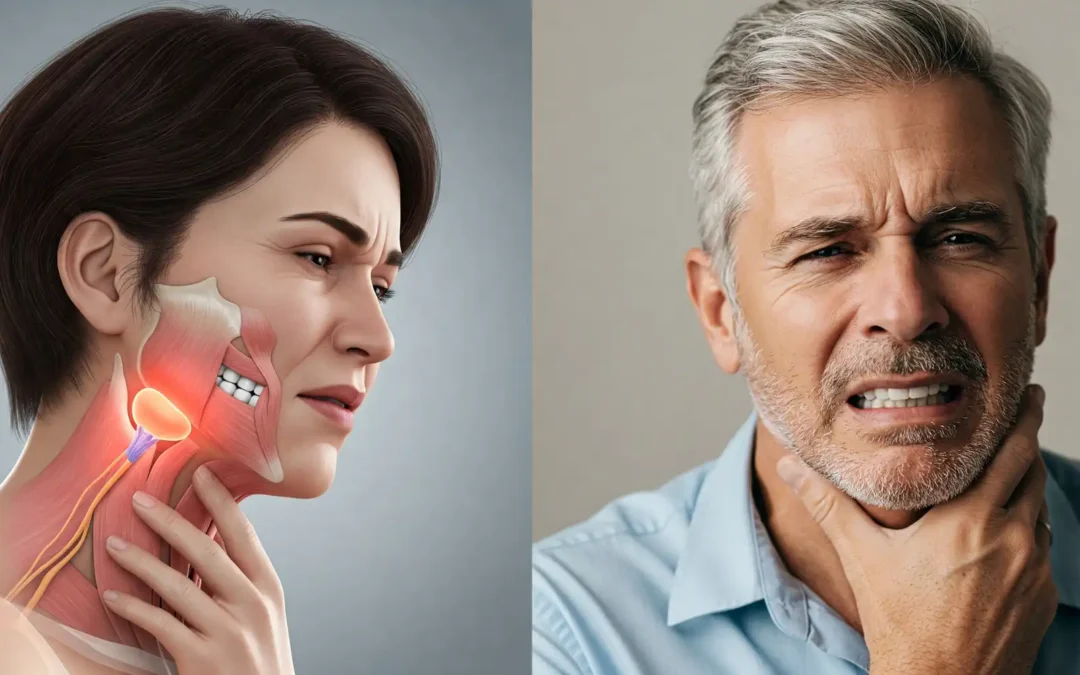That persistent click in your jaw, the recurring headaches, the tenderness when you chew – these aren’t just minor annoyances. They could be signs of Temporomandibular Joint Disorder, commonly known as TMJ or TMD. Your temporomandibular joints act like sliding hinges, connecting your jawbone to your skull on each side of your face. When these complex joints, and the muscles controlling them, aren’t working correctly, it can lead to significant discomfort and affect more than just your mouth.
At Parr Dental, we understand how TMJ disorder can impact your daily life. This post will help you recognize the signs, understand its broader health implications, and explore the effective treatment options available.
What Exactly is TMJ Disorder?
TMJ disorder refers to a variety of conditions affecting the temporomandibular joints, jaw muscles, and associated nerves. These joints are crucial for talking, chewing, and yawning. Dysfunction can arise from various factors, including:
- Arthritis damage to the joint’s cartilage
- Jaw injury (impact or dislocation)
- Chronic teeth grinding or clenching (bruxism)
- Structural jaw problems present since birth
- Stress, which often leads to muscle tightening
Recognizing the Signs: Common TMJ Symptoms
TMJ symptoms can vary widely in presentation and severity. Be aware if you experience any of the following:
- Pain or Tenderness: Discomfort in your jaw joint area, face, neck, shoulders, or in and around the ear, especially when chewing, speaking, or opening your mouth wide.
- Clicking, Popping, or Grating Sounds: Noises in the jaw joint when you open or close your mouth, or when chewing (with or without pain).
- Difficulty Chewing: A sudden uncomfortable bite, feeling as if the upper and lower teeth are not fitting together properly.
- Jaw Locking: Trouble opening or closing your mouth completely (“lockjaw”).
- Facial Pain: A tired feeling or aching pain in your face.
- Headaches: Often resembling migraines or tension headaches.
- Earaches or Ringing: Pain in or around the ear (without an ear infection) or tinnitus (ringing in the ears).
- Swelling: Noticeable swelling on the side of your face.
Beyond the Jaw: How TMJ Affects Your Overall Health
The impact of TMJ disorder often extends beyond localized pain:
- Sleep Disturbances: Pain can make finding a comfortable sleeping position difficult. Furthermore, TMJ is often linked with bruxism (teeth grinding), which commonly occurs during sleep and can worsen TMJ symptoms while also disrupting restorative sleep.
- Nutritional Challenges: Difficulty or pain when chewing can lead individuals to avoid certain foods, potentially impacting their nutritional intake.
- Chronic Pain Cycles: Persistent jaw and facial pain can contribute to chronic pain conditions and affect mood, leading to increased stress or anxiety.
- Hearing Issues: The proximity of the TMJ to the ear canal means inflammation or misalignment can sometimes cause ear pain, a feeling of fullness, or even dizziness.
Finding Relief: Effective TMJ Treatment Options
The good news is that many TMJ disorders can be effectively managed, often with conservative treatments. A thorough diagnosis is key to determining the best approach for you. Treatment options may include:
- Lifestyle Modifications & Home Care:
- Eating soft foods to rest the jaw.
- Applying moist heat or cold packs.
- Practicing stress-reduction techniques (meditation, yoga).
- Avoiding extreme jaw movements (wide yawning, loud singing, gum chewing).
- Gentle jaw stretching and relaxing exercises.
- Dental Approaches:
- Oral Appliances (Splints or Night Guards): Custom-fitted devices worn over the teeth (usually at night) can reduce clenching/grinding, reposition the jaw, and ease muscle tension. These are often a highly effective first line of treatment.
- Bite Correction: Dental treatments like orthodontics or restorations may be needed if bite misalignment is contributing to the problem.
- Medications:
- Over-the-counter pain relievers (NSAIDs like ibuprofen).
- Prescription muscle relaxants (for short-term use).
- In some cases, anti-anxiety medications or low-dose antidepressants to manage pain and bruxism.
- Therapies:
- Physical Therapy: Exercises to strengthen jaw muscles, improve flexibility, and correct posture.
- Transcutaneous Electrical Nerve Stimulation (TENS): Low-level electrical currents to relax muscles and reduce pain.
- More Advanced Procedures (Less Common):
- Injections: Corticosteroid injections into the joint for inflammation or Botox injections into jaw muscles to reduce clenching force.
- Surgery: Considered only in severe cases when conservative treatments haven’t provided relief.
Experience Relief and Compassionate Care at Parr Dental
Suffering from jaw pain, headaches, or other TMJ symptoms? You don’t have to endure the discomfort. Accurate diagnosis and personalized treatment are crucial for finding lasting relief and protecting your overall health.
At Parr Dental, we have extensive experience in diagnosing and treating TMJ disorders. We take the time to understand your specific symptoms and medical history, utilizing modern diagnostic tools to pinpoint the cause of your discomfort. Our patients consistently praise our excellent, compassionate care and the personalized treatment plans we develop. We focus on conservative, effective solutions, like custom oral appliances, tailored to your unique needs.
Don’t let TMJ pain control your life. Contact Parr Dental today to schedule a comprehensive TMJ evaluation. Let our dedicated team help you find the path to relief and improved well-being. We are committed to providing the excellent care you deserve.

